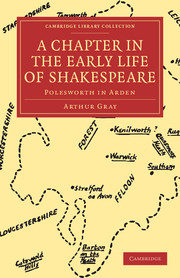Book contents
- Frontmatter
- Contents
- ILLUSTRATIONS
- SECTION 1 The Problem stated
- SECTION 2 The Marlowe fiction
- SECTION 3 The Greenwood theory
- SECTION 4 The Stratford legend
- SECTION 5 Does Shakespeare rail?
- SECTION 6 William Shakespeare, gentleman
- SECTION 7 Concerning Genius
- SECTION 8 Stratford fact and fable
- SECTION 9 The flight to London
- SECTION 10 Shakespeare's silence about Stratford
- SECTION 11 Concerning Arden
- SECTION 12 Of Poets, Patrons and Pages
- SECTION 13 What happened in 1572
- SECTION 14 Polesworth
- SECTION 15 Shakespeare in North Warwickshire
- SECTION 16 Shakespeare's road to London
- SECTION 17 Michael Drayton
- SECTION 18 The Polesworth circle
- SECTION 19 The Gooderes
- SECTION 20 The Sonnets
- SECTION 21 Southampton
- SECTION 22 Warwickshire scenes in Shakespeare's youth
- SECTION 23 The last days
- Plate section
SECTION 5 - Does Shakespeare rail?
Published online by Cambridge University Press: 07 September 2010
- Frontmatter
- Contents
- ILLUSTRATIONS
- SECTION 1 The Problem stated
- SECTION 2 The Marlowe fiction
- SECTION 3 The Greenwood theory
- SECTION 4 The Stratford legend
- SECTION 5 Does Shakespeare rail?
- SECTION 6 William Shakespeare, gentleman
- SECTION 7 Concerning Genius
- SECTION 8 Stratford fact and fable
- SECTION 9 The flight to London
- SECTION 10 Shakespeare's silence about Stratford
- SECTION 11 Concerning Arden
- SECTION 12 Of Poets, Patrons and Pages
- SECTION 13 What happened in 1572
- SECTION 14 Polesworth
- SECTION 15 Shakespeare in North Warwickshire
- SECTION 16 Shakespeare's road to London
- SECTION 17 Michael Drayton
- SECTION 18 The Polesworth circle
- SECTION 19 The Gooderes
- SECTION 20 The Sonnets
- SECTION 21 Southampton
- SECTION 22 Warwickshire scenes in Shakespeare's youth
- SECTION 23 The last days
- Plate section
Summary
Is it not a total misunderstanding of Shakespeare's character and the canons of his art to suppose that he ‘rails’? If in Shallow he permits himself to gibbet Lucy, it is the only example of personal satire—I might add, of personal reminiscence—that can be reasonably detected in his plays. To Shakespeare in his lifetime John Davies of Hereford addressed some lines which most truly illustrate that nobility in his nature which stooped to no considerations of spite or revenge, such as were exhibited by other playwrights—e.g. Jonson, Dekker and Marston.
‘Let others rail: but rail as they think fit,
Thou hast no railing, but a reigning wit:
And honesty thou sow'st, which they do reap.’
‘Honesty’: in other words ‘the fine strains of honour.’ Others may copy from him the tone of chivalry, of kings and courts, but Shakespeare is the king of courtesy. In him is instinct the ‘reigning wit,’ the ‘wisdom’ and ‘royalty of nature’ that were in Banquo.
In the matter of satire Shakespeare leaves us in no doubt as to the principles of his dramatic art. Theseus, splendidly impersonal and poetic, has the instinctive distaste of his creator for the drama which veils ‘some satire, keen and critical.’ There is only one poet whose character and quality are sketched for us in the Plays—the Poet of Timon of Athens.
- Type
- Chapter
- Information
- A Chapter in the Early Life of ShakespearePolesworth in Arden, pp. 23 - 27Publisher: Cambridge University PressPrint publication year: 2009First published in: 1926



